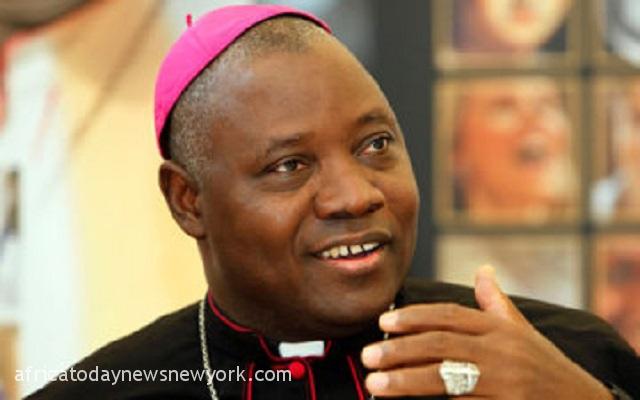The Archbishop of Abuja Catholic Archdiocese, Most Rev. Ignatius Kaigama, on Sunday revealed that Catholic Church in Nigeria will never allow any attempt by any of its Priests to engage in ‘personality cult’ in the name of adoration to pull through.
Archbishop Kaigama was, ostensibly responding to the recent outburst of a Catholic Priest in Enugu State, Rev. Fr. Ejike Mbaka, in which he (Fr. Mbaka) lambasted the presidential candidate of Labour Party, Peter Obi, for allegedly being ‘stingy’ declaring that he won’t win the 2023 presidential elections.
Archbishop Kaigama, in his Sunday homily at St. Aloysius Catholic Church, Mpape, Abuja, called on Catholic Priests to take advantage of the loyalty and respect they command among the faithful to strengthen unity, peace, and love among the people and communities instead of otherwise.
He said: ‘Priests should not allow the Mass to become an occasion for drama, exaggerated inculturation or utterances that are purely political or mundane. People come to Jesus at Mass to get spiritually nourished by the word and the bread of life, and refreshed for the long, rough and tough journey to heaven.
‘To this end, approved Catholic ‘adoration centres’ in Nigeria should really be for adoring Jesus in the Blessed Sacrament, not where to intimidate, manipulate and extort people or where a priest attempts to create a personality cult by careless and insensitive utterances and drama.
‘The Eucharist is a sacrament of healing. It’s expected of us to pray and wait patiently and expectantly, but do not time God or expect instant and dramatic results. Other than physical healing, there is also a very great need for inner healing.
‘A sad chapter in our history as a nation which calls for the healing of memory is the unfortunate civil war which still fills many with very sad memories that are a challenge to social cohesion in the country. After over 55 years, the Hausas, Ibos, Yorubas and others need healing and purification of memory.
‘We must all admit that the war was wrong and immoral and should have never been fought. We must transcend prejudices, stereotypes and barriers to build bridges of love and peace. Our major preoccupation during this season of politics should be to search and elect only credible and capable political leaders who can unite us beyond the narrow confines of tribe and religion.
‘By believing in the presence of Jesus in the Eucharist, our pathological fear of witches and evil spirits should diminish. When confronted with sickness, childlessness or material deprivation, we should not rush to soothsayers or even to some so-called men of God who may not be any different from deceptive fetish agents.
‘Let us show in our actions that the Eucharist has made a difference in the way we see, do or say things. Let us become what we receive.’

